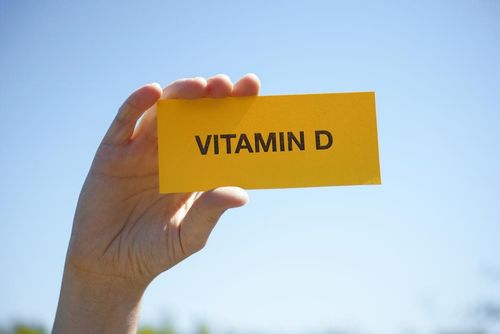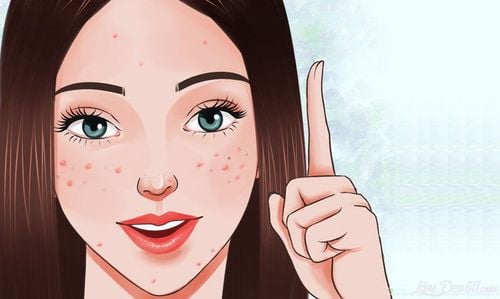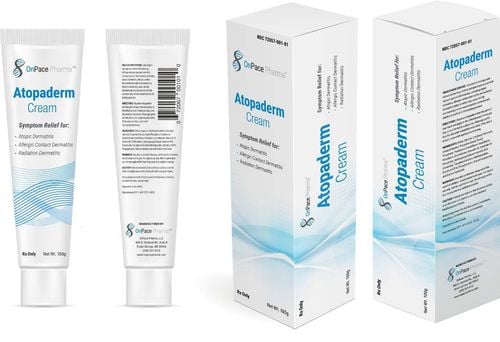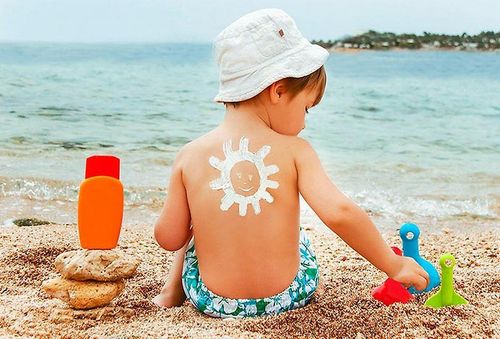This is an automatically translated article.
Ultraviolet rays cause many harms and bad effects on the body and human health. Some measures to protect the body against the effects of UV rays such as applying sunscreen, wearing long sleeves, wearing sunglasses.
1. Effects of UV rays on health
Ultraviolet rays (or ultraviolet rays, UV rays, UV radiation) in moderate doses when irradiated to the skin help enhance the metabolism and synthesis of vitamin D, necessary for the absorption of calcium, as a duo of nutrients. Good for bones, very important for height growth in young children. In addition, early morning sunlight also has a stimulating effect on the body's activity process.
Although there are many benefits to the body, but ultraviolet rays also have certain harmful effects, especially on the skin and eyes. Ultraviolet rays cause adverse effects on eyes when not wearing protective glasses against the sun. Eye cells can be damaged by the effects of UV rays, especially when the reflected beam bounces off a wall of cement, sand or water.
After being exposed to ultraviolet rays for a certain period of time, from 6 to 15 hours later, the patient will have some visual disturbances such as temporary loss of vision, seeing halos around light sources, feeling There is a foreign body in the eye, tearing, sensitivity to light, especially sunlight. Usually, if the patient is doing well and there are no other abnormalities, the visual symptoms will resolve on their own after about 8 hours.
In case if the body is exposed to ultraviolet rays many times for a long time, the risk of leading to more serious eye diseases, such as retinal damage, cataracts, even blindness.
In addition, UV rays also cause many other harmful effects on human health, such as skin aging, skin cancer, melanoma, cell tissue cancer, accelerated aging process. and immunosuppressive.
2. UVA and UVB rays
UV exposure is the leading cause of skin cancer. There are two types of UV rays:
Ultraviolet A (UVA rays): accounting for 95% of the sunlight, capable of penetrating glass, car windows, and windows. UVA rays cause premature aging and wrinkling of the skin, and play a role in causing basal cell carcinoma, squamous cell carcinoma, and melanoma. Ultraviolet B (UVB rays): Cannot penetrate car windows or other types of glass. UVB rays cause sunburn, reduce collagen and elastin production, are the main cause of skin cancer and melanoma. Protecting your skin from ultraviolet rays is protecting from both UVA and UVB rays. One of the most effective ways being used today is using sunscreen.
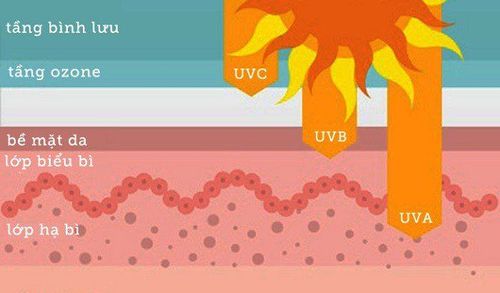
Tia UVA và tia UVB
3. Tips for using sunscreen to protect your skin
The effects of ultraviolet rays from the sun accumulate over time. Therefore, it is advisable to use sunscreen every day, even when it is cloudy. Here are some tips to help you use this product more effectively:
Choose a broad spectrum sunscreen that protects against both UVA and UVB rays. Choose products that are water resistant and have a sun protection factor (SPF) of 30 or higher. Other sunscreens can prevent sunburn, but they do not protect against skin cancer. Use a lip balm or lipstick that contains sunscreen with an SPF of at least 30. Apply a generous amount of sunscreen 15 to 30 minutes before going outdoors. Reapply to entire body every 2 hours outdoors. If you are going to the beach, swimming in a lake or sweating a lot, you should reapply the cream every 1 hour of use. Regular sunscreen is better for dry skin. As for oily or hairy areas, gel form will be more effective. Sunscreen should be applied whenever going out in the sun. Do not use products that have expired.
4. Some tips to protect your skin from the sun
Limit sun exposure between 10:00 a.m. and 4:00 p.m. as this is when the sun's intensity is strongest. Follow the rule of shading: if the shadow length is shorter than the height when it's sunny outside, look for a shady, sheltered area; Always keep infants under 6 months of age in the shade or protected from direct sunlight; Pay attention to the UV index: Shows how harmful UV exposure is at any particular time of day. The UV index is usually measured by the weather forecast center and communicated to the entire population. When this index reaches 10 or more, it means that the radiation level is very large, so avoid going outdoors; Watch for reflective surfaces like water, snow, sand, and glass. They have the ability to reflect the sun's rays, unintentionally damaging the skin, increasing the risk of sunburn as well as skin cancer; Wear protective clothing, including sun-protective clothing, such as long-sleeved shirts, collared jackets, long, dark pants, and wide-brimmed hats to cover your face, neck, and ears. If possible, a special sunscreen fabric should be selected; Wear eye protection sunglasses. Choosing a lens material with sun protection, UV absorption from 99 - 100% will best protect the eyes and surrounding skin;
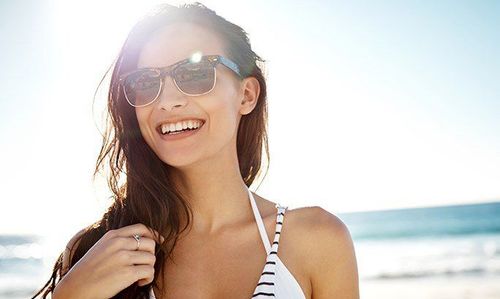
Đeo kính râm bảo vệ mắt. Lựa chọn chất liệu tròng kính có khả năng chống nắng
Supplement with fresh fruit rich in vitamin C, helping to limit harmful effects from ultraviolet rays; Recognize the side effects of certain medications that make the body more sensitive to the sun. These drugs include some antibiotics, anti-inflammatory drugs, antifungals, blood pressure medications, and some chemotherapy drugs. Avoid sunbathing when it's hot outside. Also, do not use sun lamps, tanning beds or tanning services using intense light. Use sunscreen regularly every time you go out, even when it's cloudy. Ultraviolet rays can penetrate clouds and through windows. Use lip balm or lipstick containing sunscreen with an SPF of at least 30. On summer days, the sun becomes intensely hot, it is easy to cause heat shock, greatly affecting the skin. and eyes if not properly protected. To avoid negative effects from ultraviolet rays, we should choose the right protective measures for ourselves to proactively protect our own health.
Reference source: Cancer.net
SEE ALSO:
How to choose a sunscreen that protects skin from UVA and UVB rays What time of day is the strongest UV ray? Can wearing sunscreen protect against UV rays?





